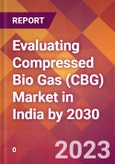Fuel of Future for Enabling Tryst of India for Energy Transition & Energy Security
Biogas is fuel produced by the anaerobic decomposition of organic waste such as agricultural waste, plant waste and organic municipal waste. Compressed biogas (CBG) is then produced by further processing of biogas in which other gases like carbon dioxide are reduced and methane is maintained at more than 90 percent quantity. CBG is also referred to as bio-CNG and could be directly used in vehicles that usually use CNG or compressed natural gas which is a fossil fuel. CBG is also used as an alternative to natural gas for cooking and in other industries like cement and steel.
Earlier this year, Prime Minister Narendra Modi inaugurated one of India’s biggest CBG (bio-CNG) plants at Indore in Madhya Pradesh, named Gobar-Dhan, which has the capacity to process 550 tonnes of waste and produce 17,000 kilograms of bio-CNG each day. The Indore Municipal Corporation (IMC) has also tied up with Gobar-Dhan and has assured the purchase of 50 percent of the fuel to run its CNG buses. IMC has also promised to provide sufficient segregated waste to the plant to ensure adequate feedstock for its biogas production.
Apart from all the state-specific investments which provide a major boost to the sector, leading corporate houses Reliance Industries and Adani New Industries Limited (ANIL) have also planned to invest Rs. 500-600 crores each in the sector. While ANIL reportedly plans to use its existing city-based gas network to use CBG in cooking fuel, Reliance Industries is expected to use its fuel outlets in India, for automobiles. However, the companies are yet to make official announcements regarding their investments. To boost availability of affordable and clean transport fuels, a MoU was signed today between MoPNG and leading oil & gas marketing companies & technology providers to establish Compressed Bio-Gas CBG) plants across India under the Sustainable Alternative Towards Affordable Transportation (SATAT) initiative, in the presence of Union Minister of petroleum and Natural Gas & Steel Shri Dharmendra Pradhan. MoUs were signed with energy companies viz. JBM Group, Adani Gas, Torrent Gas and Petronet LNG for setting up of Compressed Bio-Gas (CBG) plants, and with technology providers in CBG sectors IndianOil, Praj Industries, CEID Consultants & Bharat Biogas Energy for facilitating availability of technology for the projects.
According to the report, there is growing interest in CBG as one of the key sources of clean energy that is indigenously available and could play key role in bringing down the reliance on imports for energy & also be a key avenue for decarbonization across industries. The government’s push with the policies and schemes seems to have given the sector an impetus.
“Evaluating Compressed Bio Gas Market Potential in India by 2030” would enable companies both on the demand and supply side of market to take informed decision when it comes to making investment & also choosing CBG as they undergo their energy transition journey. The report includes a detailed assessment of feedstock potential to generate CBG in India, economically viable locations where CBG plants can be set, different business models like CBG as a service, distribution of CBG, adoption of CBG and different success stories in India and overseas, different ecosystem companies involved in CBG and the price dynamics and other factors influencing potential of CBG in India.
Table of Contents
- Executive Summary
- Natural Gas Landscape in India
- Significance of CBG in India’s Tryst for Energy Security
- Significance of CBG in decarbonization
- Understanding CBG Value Chain
- Policy Support for CBG in India
- CBG Potential in India
- Feedstock potential
- Livestock
- Sewage
- Food Waste
- Crop Residues
- Energy Crops
- Sugarcane press mud
- MSW
- Estimated production potential
- Feedstock potential
- CBG Production Technology
- CBG Business Models in India
- CBG Supply Chain
- Potential Locations for Setting up CBG Plant in India
- CBG Market in India in 2022 and 2030
- CBG Pricing in India
- CBG end use application in commercial & industry segment
- Electricity Generation
- CHP
- Heating & Burning
- Biofuel
- Key challenges
- Case study on CBG plants in India
- Case study on CBG adoption in global markets
- CBG projects in India - Planned, Announced & Under Construction
- ULBs plan on CBG as tool for waste management
- Demand Barometer - Customer Survey on CBG Adoption
- Key Companies in CBG Space in India
- Equipment OEMs
- CBG Suppliers
- CBG Financiers
- OMCs








